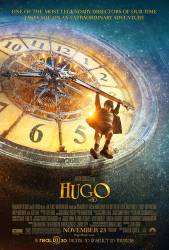Trivia: Shortly after Hugo drops a piece of metal from the suspending clock to the ground of the train station, the Station Inspector, assuming that Claude dropped it, loudly asks him if he is 'drunk, inebriated, shikker, etc.' The work shikker is from the Hebrew word shikkor for 'drunk'. Shikker actually means drunkard.

Hugo (2011)
2 trivia entries
Directed by: Martin Scorsese
Starring: Christopher Lee, Ben Kingsley, Chloe Grace Moretz, Asa Butterfield
Continuity mistake: There is a scene where Hugo is on the station and sees a key down on the tracks. There are two separate shots of the key and both times it is buried in the stones next to a sleeper. Then Hugo jumps down onto the tracks to pick it up and its now sat on the middle of the sleeper when he picks it up. (01:22:30 - 01:23:10)
Isabelle: This might be an adventure, and I've never had one before - outside of books, at least.
Question: Why does the Station Inspector chase children who are on their own and threaten to send them to an Orphanage? Is that what it was like in the 1930s?
Chosen answer: It is more than likely an early form of our modern day child protection. Just as today if children are found to be at risk, they can be and are taken away by social services and put into foster care. In the film, orphans may have been seen as a plague in an area that attracts posh looking people in stark contrast to urchins in rags eating out of bins. Most European orphanages/care homes/hospices/whatever you want to call them at that time were no better than anything depicted in Charles Dickens 50 years previously.
Join the mailing list
Separate from membership, this is to get updates about mistakes in recent releases. Addresses are not passed on to any third party, and are used solely for direct communication from this site. You can unsubscribe at any time.
Check out the mistake & trivia books, on Kindle and in paperback.




Answer: He's not making it a point to chase down random children - he's like a security officer at an airport. It's his job to apprehend thieves and troublemakers and keep the station safe, and he only threatens to send children to the orphanage if they don't have parents for him to return them to. Also, it's implied once he finally apprehends Hugo that his particular harshness toward orphans (and most of his character flaws in general) is due to apparently having been one himself. He spells out the kinds of lessons he was forced to learn by growing up without a family, explaining how he became so cold, bitter, and antisocial.